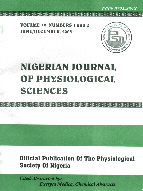
|
Nigerian Journal of Physiological Sciences
Physiological Society of Nigeria
ISSN: 0794-859X
Vol. 32, No. 2, 2017, pp. 129-136
|
 Bioline Code: np17020
Bioline Code: np17020
Full paper language: English
Document type: Research Article
Document available free of charge
|
|
|
Nigerian Journal of Physiological Sciences, Vol. 32, No. 2, 2017, pp. 129-136
| en |
Effects of Lipopolysaccharide and High Saline Intake on Blood Pressure, Angiogenic Factors and Liver Enzymes of Pregnant Rats
Oludare, G.O.; Ilo, O.J. & Lamidi, B.A.
Abstract
Summary: This study investigated the effect of high salt water intake and lipopolysaccharide injection as probable rat models of preeclampsia during pregnancy. Thirty-three female Sprague-Dawley rats weighing between 150-170g were divided into 4 groups of the control (normal saline), high salt water intake (1.8% NaCl from days 13-18 of pregnancy), lipopolysaccharide group (40 μg/kg b.w. ip injection from day 16-18 of pregnancy) and high salt water (1.8% NaCl) and lipopolysaccharide injection (40 μg/kg b.w i.p. from days 16-18 of pregnancy). Urine samples were collected on day 18 of pregnancy and the animals were sacrificed on day 19 of pregnancy for blood pressure parameters, angiogenic and liver enzyme assays. The systolic, diastolic and mean arterial blood pressure of pregnant rats on high saline intake increased significantly when compared with control. Fetal weight was decreased while VEGF levels were increased in this group and no difference was found in the protein and liver enzyme levels. Decreased fetal weight was also observed in HS + lip group accompanied with an increase in PIGF, and VEGF levels with no change in blood pressure, protein and liver enzymes. Similar result was found in the Lipopolysaccharide alone group but with additional changes such as increase in VEGFR-1 levels and protein levels. Both high salt and lipopolysaccharide presents preeclampsia symptoms but the absence of protein in the urine in high salt water intake group as well as the inability of lipopolysaccharide to increase blood pressure suggest that both substances might not be ideal for preeclampsia research in rats.
Keywords
Preeclampsia; Lipopolysaccharide; Placental growth factors; High salt; Vascular endothelial growth factor
|
| |
© Copyright 2017 - Physiological Society of Nigeria
|
|
